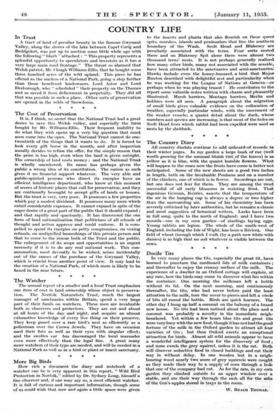The Cost of Preservation
It is, I think, no secret that the National Trust had a great desire to save this Welsh valley, and especially the farm bought by Mr. Williams-Ellis. Their frequent inability to do what they wish opens up a very big question that must soon come into the open. The National Trust cannot do one= twentieth of the things that it wants to do. It is forced to look every gift horse in the mouth, and after inspection usually decides to refuse the offer, for the simple reason that the price is too high, even when the land is given outright The ownership of land costs money ; and the National Trust is wholly unendowed. Its name has perhaps given the public a wrong idea of its constitution. The nation as such gives it no financial support whatever. The very able and public-spirited persons who direct its energies have an efficient intelligence department, who know at this moment of scores of historic places that call for preservation, and they are continually besought to accept gifts of lands or houses. But the trust is very, very poor. It possesses a few properties which pay a modest dividend. It possesses many more which entail considerable expenses. It cannot expand in spite of the eager desire of a great part of the public that it should expand ; and that rapidly and spaciously. It has discovered the one form of land nationalization that politicians of all schools of thought and action approve and could endorse. It is com- pelled to spend its energies on petty compromises, on vexing refusals, on undignified beseechings of this private person and that to come to the rescue both of the Trust and the public. The enlargement of its scope and opportunities is an urgent necessity if it is to do any real national work. This con- summation, most devoutly to be wished, arises incidentally out of the causes of the purchase of the Gwynant Valley, which is crucial from another point of view. It may lead to the creation of a National Park, of which more is likely to be heard in the near future.






































 Previous page
Previous page